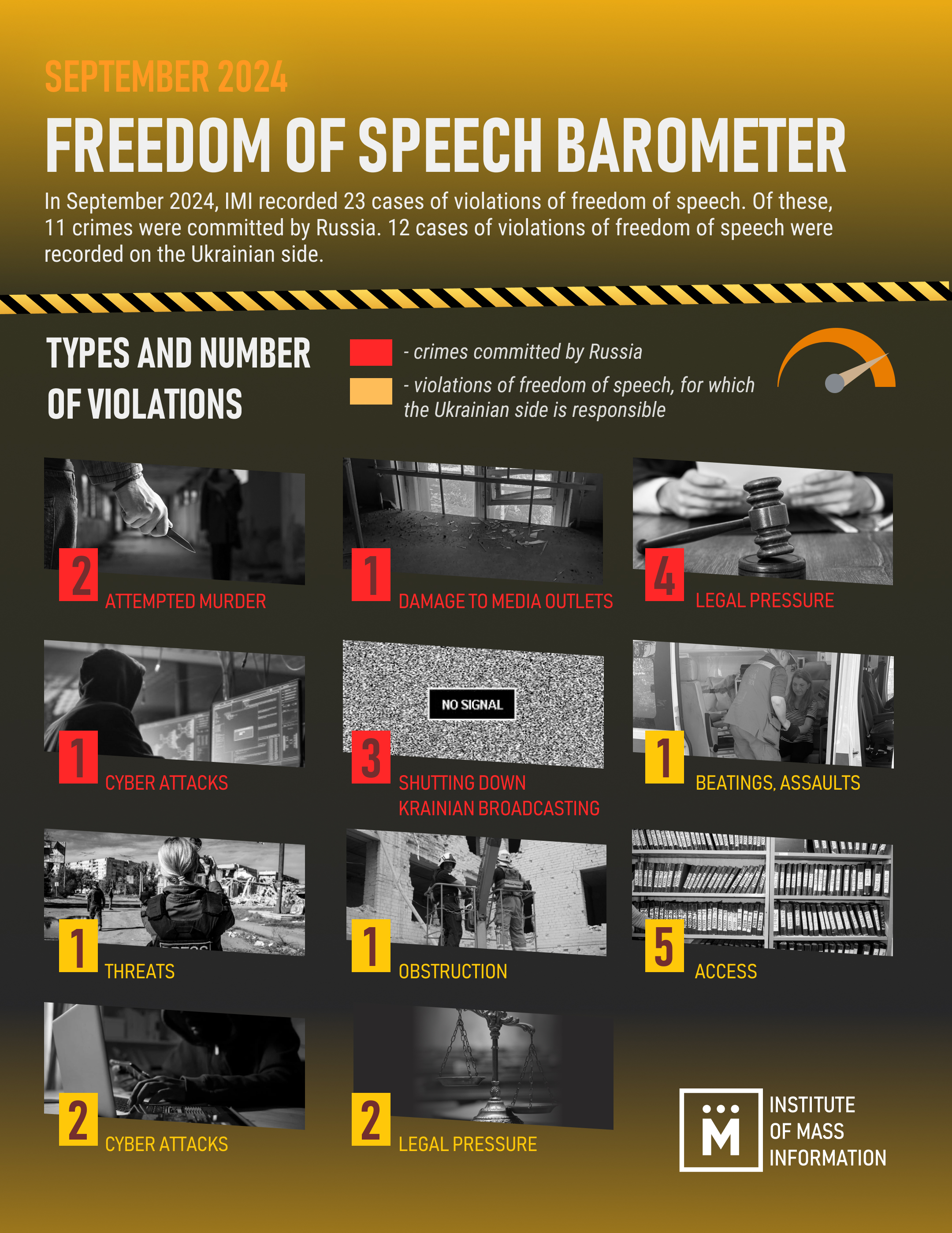The Institute of Mass Information experts recorded 23 freedom of speech violations in Ukraine in September, according to the monthly IMI monitoring “Freedom of Speech Barometer”.
Russia’s crimes (11 cases) inlcuded assassination attempts, damaging media offices, legal pressure, cyber attacks, and shelling strikes that caused Ukrainian broadcasting to be disabled.
Three media professionals were killed in action due to Russia’s aggression:
- Pavlo Parkhomenko, a serviceman of the Ukrainian Armed Forces of Ukraine and Priamyi TV cameraman.
- Ihor Zakharov, a soldier and cameraman (previously with Ukraina TV and 1+1); his death was reported in September. Ihor had gone missing a year before that and his fate had been unknown. Recently his remains were discovered and the examination confirmed that it was him.
- Stanislav Zhytnytskyi, a soldier and line producer with the STB and Novyi Kanal. He was killed in action in September while performing a combat task.
According to the IMI, as of October 2, 89 media professionals have died in Ukraine as a result of Russia’s full-scale aggression, with 11 of those dying while reporting.

Freedom of speech in Ukraine in September 2024
During the study period, the experts recorded two cases of attempted assassination of media professionals, targeting Dmytro Gordon and Odesa journalists.
The Suspilne office in Dnipro was damaged by Russian shelling. The main entrance door was damaged, windows on the second floor of the main building and in the former radio building were broken. None of the employees were injured. At the time of the shelling strike, one person was in the office – she managed to take cover in a safe place.
Due to the hostilities and the difficult safety situation in Hirnyk (Donetsk oblast), Hromadske Radio ceased broadcasting. In Pokrovsk (Donetsk region), a Russian shelling strike destroyed the broadcasting equipment used by Hromadske Radio and the local TV channel “Capri”.
The digital news aggregator FREEDOM faced a massive DDoS attack on their website. The attack took place in two waves. The website received over 30 million requests in a short time from Singapore, USA, United Kingdom, Thailand, Germany, Indonesia, France, China, Hong Kong and other countries. The channel believes that Russian hackers are behind the attack.
Russia’s FSB opened criminal cases against three foreign journalists for reporting from Sudzha: Australia’s ABC News correspondents Fletcher Yeung and Kathryn Diss, and freelancer Mircea Barbu, who reports for the Romanian media outlet HotNews. All three are charged with illegally crossing the border and filming near Sudzha.
The IMI also recorded 12 freedom of speech violations not related to Russia’s war on Ukraine. These were cases of physical aggression against journalists (attacks, threats, obstruction), restriction of access to public information, cyber attacks, and legal pressure.
MOST journalist Olena Hnitetska was attacked by an unknown man on a school’s premises in Kherson. The man shoved her and took away her phone, tossing into a pit where construction equipment was working.
In Zaporizhzhia, residents of a local private sector interfered with the work of Elmira Shahabudtdynova, a journalist with the local website 061.ua, as she was photographing the aftermath of a Russian shelling strike. The people blocked her way, insulted her, threatened her, and demanded she delete the pictures she had already taken. They claimed that journalists only make things worse and that it is them who cause the shelling.
Journalists from several Ukrainian and international media outlets reported obstruction by officials and police in Poltava: they were not allowed to enter the site of a Russian missile strike. The Russian missile attack on Poltava on September 3 killed over 50 people and injured nearly 300. The building of the Institute of Communications and the nearby hospital were hit.
Restriction of access to public information was reported by:
- the Zaporizhzhia Center of Investigations (ZCI), who were refused information on the price of underground school construction by the Zaporizhia state-owned enterprise “Local Roads of Zaporizhzhia Oblast”;
- “Poltavska Dumka”, who received no reply to their query regarding the repair of the Hadyach–Opishnya highway from the Infrastructure Reconstruction and Development Service in Poltava oblast;
- the investigative journalism center NikCenter, whom the Odesa Oblast Military Administration (OVA) refused to provide the list of persons who were nominated for state awards during the war;
- the “Suspilne Poltava” journalist Ihor Izotov, who says that the Poltava Oblast Council press office did not provide the TV channel with a link to the August 30 session livestream because of his post in his own Telegram channel.
The Poltava City Council’s executive committee held a meeting which was off-limits for the media, yet was attended by journalists from the TV channel IRT-Poltava.
The investigative journalism agency “Slidstvo.Info” suffered a DDoS attack after releasing an investigation into the high-end property owned by the Minister of Agrarian Policy, Vitaliy Koval. The team believes that the attack was directly connected with the Koval investigation, as the attack began an hour after its release.
Read the full monitoring here.
The Institute of Mass Information (IMI) is a Ukrainian non-governmental media organization that has been operating since 1996. The IMI defends the rights of journalists, analyzes the media field and covers media-related events, fights propaganda and disinformation and has been providing media outlets with safety gear for trips to the combat zone since the start of the Russo–Ukrainian war in 2014.
The IMI carries out Ukraine’s only freedom of speech monitoring and keeps a list of high quality and sustainable online media outlets, documents Russia’s crimes against the media committed in the course of the war on Ukraine. The IMI has representatives in 20 oblasts of Ukraine and a network of “Mediabaza” hubs to provide journalists with continuous support. The IMI’s partners include Reporters Without Borders and Freedom House; the organization is a member of the International Organization for the Protection of Freedom of Expression (IFEX).
